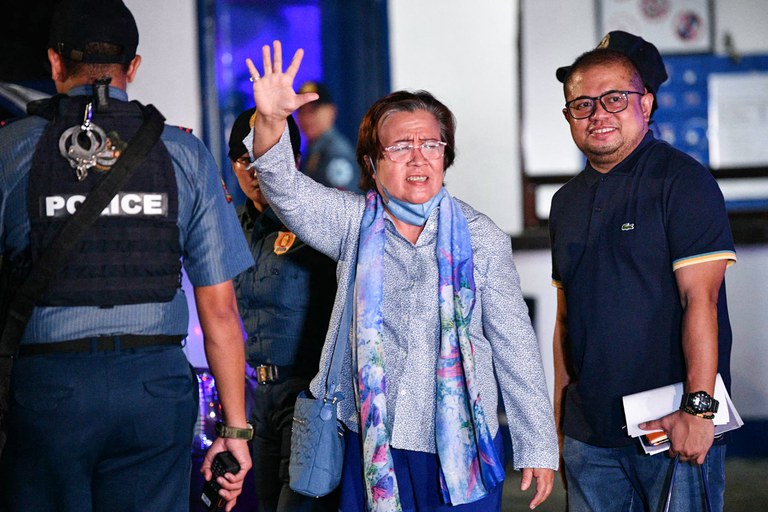The European Union offered tentative praise for steps taken by the Ferdinand Marcos administration to address human rights concerns in its latest GSP+ trade review, but urged “more resolute actions” to ensure accountability for extrajudicial killings under former President Rodrigo Duterte’s “war on drugs.”
Duterte’s drug war killed more than 8,000 Filipinos during his 2016-2022 presidential term, according to government figures. It is subject of an ongoing investigation by the International Criminal Court at The Hague.
“Human rights concerns relate notably to extrajudicial killings of people allegedly involved in the trade and use of drugs under the previous administration, and the insufficient investigation and prosecution thereof,” the European Commission’s 2020-2022 review released Tuesday said.
Concerns are also related to “impunity around attacks, harassment, red-tagging and, in some cases, killings of human rights defenders, political opponents, members of clergy, journalists, trade unionists, environmental defenders and indigenous people,” the 28-page report said.
The review assesses the Philippines’ compliance with the conditions set under the European Union Generalized Scheme of Preferences (GSP+).
The GSP+ agreement allows developing countries including the Philippines to have tariff-free access to the EU’s market provided they comply with certain human and labor rights obligations.
The commission noted that it also monitored “very serious violations of the freedom of association,” including the killing, intimidation and arrests of trade union members.
But it cited some improvements, noting that the Marcos administration to cooperated with international rights groups and was open to changing the government’s drug control policy.
“The new administration has shown willingness to engage with the international community on human rights, having actively participated in multiple mechanisms of the U.N. Human Rights Council (UNHRC),” the report said.
“More recent positive developments include the government’s new focus on prevention and rehabilitation in the war on drugs, active participation in the works of the UNHRC and the visits of several U.N. special rapporteurs,” it said. “The government has also made statements on its intention to fight against impunity.”

The report said the Marcos administration’s “more balanced” anti-illegal drug approach should continue.
“The deficiencies in the judiciary system and in law enforcement still need to be addressed and perpetrators of human rights violations brought to justice,” it said.
“Philippines’s authorities have taken several steps to address points of concern, even if tangible results are now needed.”
The Marcos administration and his immediate predecessor Duterte’s lawyers did not immediately respond to BenarNews requests for comment on the report.
Marcos has refused to cooperate with the ICC’s investigation into Duterte’s drug war.
“We continue to defend the sovereignty of the Philippines and continue to question the jurisdiction of the ICC in their investigations here in the Philippines,” Marcos said in July.
The Philippines is no longer a signatory to the Rome Statute that created the ICC, after Duterte withdrew from the treaty in 2019. But the tribunal’s top prosecutor, Karim Khan, said the ICC has jurisdiction over the issue because Manila was still a party at the time the alleged crimes were committed.
In February, the Philippines tried to block the investigation by appealing to the ICC, which rejected the appeal.
EU had sent ‘a message of impunity’
On Wednesday local time, Human Rights Watch issued a statement criticizing the EU’s lack of transparency and effort in implementing its trade incentives in developing countries.
Claudio Francavilla, HRW’s senior EU advocate, said the GSP+ program had not been used to stop the killings under the former leader.
“The EU GSP+ report on the Philippines shows that the bloc has tolerated too many serious human rights abuses under Duterte, sending a message of impunity that now risks echoing through the Marcos administration,” Francavilla said.
“Unless the E.U. sets clear rights benchmarks for compliance, Marcos’ government – and other governments in the region – will hardly take the GSP+ human rights conditionality seriously.”
Despite a few good developments in the Philippines, the GSP+ should push for actual rights reforms and accountability in the country, Francavilla said.
The E.U. lobbied to drop charges against journalist Nobel laureate Maria Ressa and the release from jail of former Sen. Leila de Lima, who was Duterte’s political nemesis.
Ressa was cleared of tax evasion charges in September but still faces two legal cases, while de Lima was recently released on bail and faces one remaining drug trafficking charge.
“Progress in all aspects of bilateral relations between the E.U. and the Philippines and the continuation of the GSP+ should be linked to concrete human rights reforms and accountability,” Francavilla said.
This post was originally published on this site be sure to check out more of their content.








